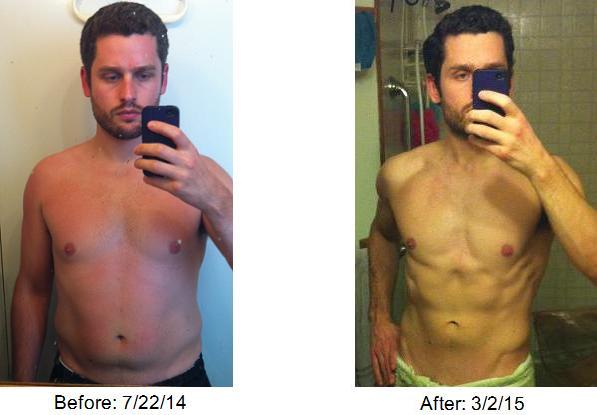This approach is totally wrong. The much better question to ask is “what can I stop worrying about to make improving my health & fitness easier?” If the strategy at hand to achieve a goal is simpler, easier, and less time consuming, the more likely you are to succeed. That’s just basic logic. With that sentiment, I’m going to share with you the top five things people worry about that don’t actually matter for weight loss. The less nonsense you worry about, the more effort you can focus on the true weight loss fundamentals that matter. Before I get into it, though let me share my personal results in applying what I’m about to share in this article:
That’s 7 months of solid progress, during which the following was true:
No food type restriction. I ate whatever I wanted (with reasonable moderation) No cardio Weight lifting in the gym 2 – 3 times per week, no longer than 45 minutes per session No meal frequency/timing restriction. There were plenty of huge carb heavy meals late at night Plenty of gluttonous restaurant meals and family dinners
You’re thinking… “this contradicts everything I know that someone ‘should’ do to lose weight, how is this possible?” Well, as I said, people’s priorities are generally speaking way out of whack when it comes to weight loss. To help get things back “in whack,” here are the top 5 things people worry about for weight loss that don’t actually matter.
1. Meal Frequency
Perhaps the most pervasive and damaging fitness myth is that one needs to eat small frequent meals to upkeep the metabolic fire, else enter fat loss stalling “starvation mode.” Let me be clear, there is absolutely zero scientific evidence that this is true. No ward based clinical trials have ever showed that manipulating short term meal frequency influences weight gain/loss or one’s metabolic output. In fact, in reality it takes over 3 days of fasting before there is a measurable decrease in caloric expenditure.
2. Meal Timing
Similar to #1, there is no scientific evidence that short term meal timing influences weight gain/loss. As long as your overall caloric intake is under control, it doesn’t matter if you’re pounding carbs at 10:00am or 10:00pm, or if you eat breakfast when you first wake up or after noon.
3. Food Selection
All aboard the fad diet train! Hucksters would love for you to believe that their special food type diet holds the magic key to weight loss: Paleo, Gluten Free, Vegan, Low Carb, Low Fat, the list goes on and on. But, aside from a small metabolic and satiety advantage garnered from higher protein intake, the food you eat for weight loss really doesn’t matter all that much. A nutrition professor shows us this with his ground breaking Twinkie weight loss diet. I’m not saying you can eat whatever you want, or that healthy eating isn’t important. Just understand that a “clean” diet in excess is still a diet in excess. To lose weight, you have to eat less than you burn, one way or another. And, a little junk here and there won’t stall weight loss, as long as you’re maintaining that negative energy balance.
4. Exercise
Of course you need to exercise to lose weight, right? No, you don’t. If you’re burning more energy than you’re consuming over time, you’ll lose weight. It doesn’t matter if you do it by increasing your caloric expenditure with working out, or if you decrease your caloric intake by eating less. They are both means to the same end. Don’t take me as saying exercise isn’t important. It is, of course, but do understand that begrudgingly adhering to an unsustainable hour+ a day of cardio regiment is not necessary for weight loss. Rather, focus on doing exercise that you enjoy, makes you feel good, and improves your health. Exercising with the primary goal of weight loss is not an effective strategy.
5. Too Much Carbohydrate or Fat Intake
The crux of virtually every fad diet is the ostensible restriction of carbs or fat. Too many grams of a so called boogeyman nutrient and you’ll stall your weight loss. It’s bogus. You can only eat too much fat or carbohydrate insofar as you’re eating too many calories. As long as your caloric intake over time is under control, it really doesn’t matter how much of each you eat. Optimal fat and carb intake depends on the person, their activity levels, and their lifestyle. Don’t pigeonhole yourself into ostensible macronutrient restriction to adhere to a fad diet. Do eat in such a way that you feel/perform your best. That optimal way will be different for everyone.
Conclusion
At the end of the day, if you’re eating less calories than you burn over time, you will lose weight. It’s pretty much a scientifically infallible truth at this point. No matter what else you do, if that condition is met you will lose weight. The take home point: Stop worrying about anything else, especially if it comes at the expense of worrying about that.
